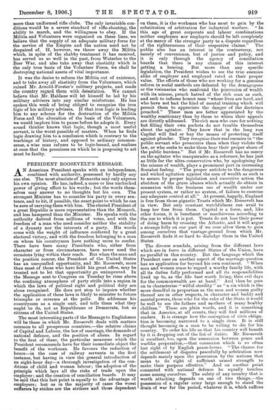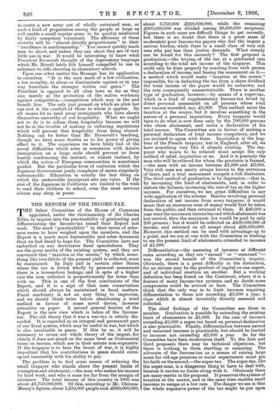PRESIDENT ROOSEVELT'S MESSAGE.
AN American President speaks with an independence, combined with authority, possessed by hardly any one else. The most absolute of Monarchs may only express his own opinion. He has, indeed, a more or less unchecked power of giving effect to his words ; but the words them- selves may answer to no thoughts but his own. The strongest Minister has to consider his party in every sen- tence, and to hit, if possible, the exact point to which he can be sure of carrying them with him. The elected President of a great Republic is more representative than the Monarch, and less hampered than the Minister. He speaks with the authority derived from millions of votes, and with the freedom of a man who need consider neither the stability of a dynasty nor the interests of a party. His words come with the weight of influence conferred by a great electoral victory, and with the freedom belonging to a man on whom his countrymen have nothing more to confer. There have been many Presidents who, either from character or from circumstances, have never used the occasions lying within their reach. But when the man and the position concur, the President of the United States has an unequalled opportunity, and Mr. Roosevelt, more than most of those who have held his great office, may be trusted not to let that opportunity go unimproved. In the Message sent to Congress on Tuesday he rises above the confining atmosphere of party strife into a region in which the laws of political right and political duty are alone recognised. He does not stop to inquire whether the application of these laws is likely to minister to future triumphs or reverses at the polls. He addresses his countrymen as a single unit, and tells them what they ought to do, not as Republicans or Democrats, but as citizens of the United States.
The most interesting parts of the Message to Englishmen will be those in which Mr. Roosevelt deals with matters common to all prosperous countries,—the relative claims of Capital and Labour, the law of marriage, the demands of national defence, and the position of aliens. In regard to the first of these, the particular measures which the President recommends have for their immediate object the benefit of the workman. He favours the reduction of hours—in the case of railway servants in the first instance, but having in view the general introduction of in eight-hour day—a thorough investigation of the con- ditions of child and woman labour; the adoption of the principle which lays all the risks of trade upon the employer; and the creation of conciliation boards. It may be said that this last point is equally to the advantage of employers; but as in the majority of cases the worst sufferers by strikes are the strikers and those dependent on them, it is the workman who has most to gain by the substitution of arbitration for industrial warfare. "In this age of great corporate and labour combinations neither employers nor employes should be left completely at the mercy of the stronger party to a dispute regardless of the righteousness of their respective claims." The public also has an interest in the controversy, not merely of convenience, but of justice and policy, and it is only through the agency of conciliation boards that there is any chance of this interest getting a hearing. But more than any specific legislation, the President wishes to see the true enemies alike of employer and employed rated at their proper value. The efforts of those who are working for a genuine reform in social methods are defeated by the demagogues or the visionaries who confound the possession of wealth with its misuse, preach hatred of the rich man as such, and seek to inflame honest men "whose lives are hard, and who have not had the kind of mental training which will permit them to appreciate the danger of the doctrines preached." These men are better appreciated by the wealthy reactionary than by those to whom their appeals are directly addressed. The rich men who care for nothing but filling their own pockets do not trouble themselves about the agitator. They know that in the long run Capital will find or buy the means of protecting itself against plunder. They recognise their real enemies in "the public servant who prosecutes them when they violate the law, or who seeks to make them bear their proper share of the public burdens." But if Mr. Roosevelt has no mercy on the agitator who masquerades as a reformer, he has just as little for the ultra-conservative who, by apologising for the misuse of wealth, plays a prominent part in increasing Socialist feeling. "The proper antidote to the dangerous and wicked agitation against the men of wealth as such is to secure by proper legislation and executive action the abolition of the grave abuses which actually do obtain in connexion with the business use of wealth under our present system, or rather no system, of failure to exercise any adequate control at all." At present, happily, England is free from those gigantic Trusts which Mr. Roosevelt has in view. But only constant watchfulness can avail to keep her free from them. Capital is a force, and, like other forces, it is beneficent or mischievous according to the use to which it is put. Trusts do not lose their power of doing harm by crossing the Atlantic, and it will argue a strange folly on our part if we ever allow them to gain among ourselves that vantage-ground from which Mr. Roosevelt finds it so hard to dislodge them in the United States.
The divorce scandals, arising from the different laws which are in force in different States of the Union, have no parallel in this country. But the language which the President uses on another aspect. of the marriage question has an application far beyond his own continent. "When men and women cease to regard a worthy family life, with all its duties fully performed and all its responsibilities lived up to, as the life best, worth living, then evil days for the commonwealth are at hand." And then he goes on to characterise "wilful sterility" as "a sin which is the more dreadful in proportion as the men and women guilty thereof are in other respects, in character and bodily and mental powers, those who for the sake of the State it would be well to see the fathers and mothers of many healthy children." These are plain words, and it is something that in America, at all events, they will find millions of readers. It is strange how the conception of civic obliga- tion is becoming narrowed to a, single item. It is still thought becoming in a man to be willing to die for his country. To order his life so that his country, will benefit by it is dropping out of the list of duties. Mr. Roosevelt is excellent, too, upon the connexion between peace and warlike preparation,—that connexion which is so often lost sight of by English peace-lovers. "The chance for the settlement of disputes peacefully by arbitration now depends mainly upon the possession by the nations that mean to do right of sufficient armed strength to make, their purpose effective." And on another point connected with national defence he equally touches some among ourselves. The safety of any country that is worth attacking depends on one of two things,—the possession of a regular army large enough to stand the drain of war for the period, whatever it is, which suffices to create a new army out of wholly untrained men, or such a kind, of preparation among the people at large as will enable a small regular army to be quickly reinforced by fairly competent volunteers. The efficiency of these recruits will be "almost directly proportionate" to their "excellence in marksmanship." You cannot quickly teach men to shoot, and unless they can shoot they are of very little use in war. It would be interesting to know what President Roosevelt thought of the deprecatory language which Mr. Birrell lately felt himself compelled to use in reference to rifle-shooting in elementary schools.
Upon one other matter the Message has its application to ourselves. "It is the sure mark of a low civilisation, a low morality, to abuse or discriminate against or in any way humiliate the stranger within our gates." The President is opposed to all alien laws so far as they aim merely at the protection of the native workman against competition,—competition which may in the end benefit him. The only just ground on which an alien law can rest is the conduct of those to whom it applies. By all means let us send away immigrants who have shown themselves unworthy of our hospitality. What we ought not to do is to refuse them hospitality because we will not be at the trouble of making or enforcing regulations which will prevent that hospitality from being abused. Nothing can be better than Mr. Roosevelt's teaching, though we have some doubts as to his power of giving effect to it. The experience we have lately had of the moral difficulties which arise in connexion with Asiatic immigration on a large scale should prevent us from hastily condemning the instinct, or almost instinct, by which the action of European communities is sometimes guided. But the particular form of exclusion which the Japanese Government justly complains of seems singularly unreasonable. Education is usually the last thing on which the undesirable immigrant sets any.value. If the sins of the Japanese in California are limited to the wish to send their children to school, even the most nervous citizen may sleep in peace.



























































 Previous page
Previous page